This content is being reviewed in light of recent changes to federal guidance.
New Hurston Studies and Beyond
The following is the third installment of a three-part series recapping the events of the Project on the History of Black Writing’s 2021 NEH Summer Institute, Hurston on the Horizon: Past, Present, and Future.
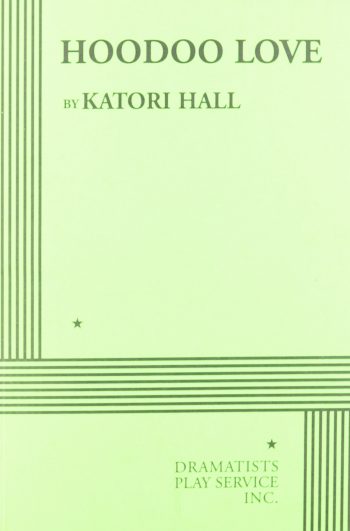 Dr. Kevin Quashie, author of Black Aliveness, or A Poetics of Being (2021), spoke about Zora Neale Hurston’s ever-evolving work as a literary theorist during the final week of HBW’s NEH Summer Institute. “What we have in Hurston’s dossier is an ambivalent theory of Black critique,” he stated, “one that resists, or refuses, the need for Black culture to be made more static than it is.” Movement, adaptability, and resistance are terms that articulate Hurston’s timeless influence and classic expressions for Black literary criticism and pedagogy. Reflecting HBW’s goals to advance teaching and research in African American literature through professional development opportunities and collaborative partnerships, the final week of Hurston on the Horizon: Past, Present, and Future focused on Hurston as a canonical Black woman theorist as well as the speculative implications of her literary and ethnographic work. Week 3 encompassed pre-recorded lectures and papers from a variety of literary and cultural scholars paving new trajectories for Hurston studies; along with Dr. Quashie, Dr. LaMonda Horton-Stallings and Dr. Giselle Anatol also presented throughout the week. Primary readings such as Katori Hall’s play Hoodoo Love, Nalo Hopkinson’s novel Brown Girl in the Ring, and Peter Bagge’s graphic biography Fire!! encouraged the NEH Summer Scholars to think about nuanced and non-traditional approaches to studying Hurston’s oeuvre in tandem with rich discussions generated by participants and faculty over the course of the Institute. Participants questioned how Hurston studies can become a measure for reassessing and reimagining the author’s work and African American literature of the past, present, and future more broadly. At the end of Week 3, NEH Summer Scholars built intellectual and collegial connections by sharing their discoveries about Hurston studies through a series of presentations which emphasized the scholarly impact of her legacy on their own classroom pedagogies and research interests.
Dr. Kevin Quashie, author of Black Aliveness, or A Poetics of Being (2021), spoke about Zora Neale Hurston’s ever-evolving work as a literary theorist during the final week of HBW’s NEH Summer Institute. “What we have in Hurston’s dossier is an ambivalent theory of Black critique,” he stated, “one that resists, or refuses, the need for Black culture to be made more static than it is.” Movement, adaptability, and resistance are terms that articulate Hurston’s timeless influence and classic expressions for Black literary criticism and pedagogy. Reflecting HBW’s goals to advance teaching and research in African American literature through professional development opportunities and collaborative partnerships, the final week of Hurston on the Horizon: Past, Present, and Future focused on Hurston as a canonical Black woman theorist as well as the speculative implications of her literary and ethnographic work. Week 3 encompassed pre-recorded lectures and papers from a variety of literary and cultural scholars paving new trajectories for Hurston studies; along with Dr. Quashie, Dr. LaMonda Horton-Stallings and Dr. Giselle Anatol also presented throughout the week. Primary readings such as Katori Hall’s play Hoodoo Love, Nalo Hopkinson’s novel Brown Girl in the Ring, and Peter Bagge’s graphic biography Fire!! encouraged the NEH Summer Scholars to think about nuanced and non-traditional approaches to studying Hurston’s oeuvre in tandem with rich discussions generated by participants and faculty over the course of the Institute. Participants questioned how Hurston studies can become a measure for reassessing and reimagining the author’s work and African American literature of the past, present, and future more broadly. At the end of Week 3, NEH Summer Scholars built intellectual and collegial connections by sharing their discoveries about Hurston studies through a series of presentations which emphasized the scholarly impact of her legacy on their own classroom pedagogies and research interests.
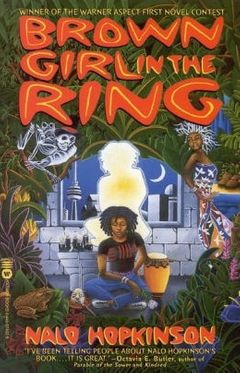 The Institute helped develop strategies for teaching African American literature by examining how Hurston’s intellectual and philosophical imaginings advance a way of reading texts and an ethos of interpretation. Dr. Quashie distinguished critique studies as asking the general questions about how one reads (i.e., “whether you’re reading to unearth something there, where you’re reading as a reparative act, or with a kind of openness”), while criticism is the practice of accessing and analyzing a text. Scholars shared some of their challenging experiences teaching at predominantly white institutions and having students challenge their reading interpretation and assignment choices. Responding to the racial and gender dynamics of such encounters in the classroom, Quashie mentioned we should remember that a part of reading a Black-authored text is reading it in an anti-Black, misogynist world. “What is our orientation to reading, and what is our responsibility?” he asked in the discussion. “Reading is not a transparent act. That’s why I lean on critique studies. Let’s think of what it is to try to read or behold a text.”
The Institute helped develop strategies for teaching African American literature by examining how Hurston’s intellectual and philosophical imaginings advance a way of reading texts and an ethos of interpretation. Dr. Quashie distinguished critique studies as asking the general questions about how one reads (i.e., “whether you’re reading to unearth something there, where you’re reading as a reparative act, or with a kind of openness”), while criticism is the practice of accessing and analyzing a text. Scholars shared some of their challenging experiences teaching at predominantly white institutions and having students challenge their reading interpretation and assignment choices. Responding to the racial and gender dynamics of such encounters in the classroom, Quashie mentioned we should remember that a part of reading a Black-authored text is reading it in an anti-Black, misogynist world. “What is our orientation to reading, and what is our responsibility?” he asked in the discussion. “Reading is not a transparent act. That’s why I lean on critique studies. Let’s think of what it is to try to read or behold a text.”
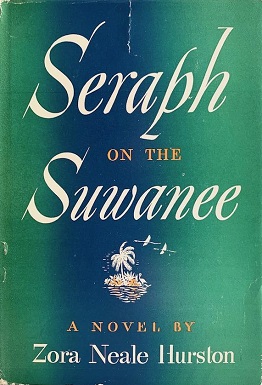 Reading and interpretation became central themes for the remaining sessions of the week. Dr. LaMonda Horton-Stallings, author of Mutha’ Is Half A Word: Intersection of Folklore, Vernacular, Myth, and Queerness in Black Female Culture (2007) and The Afterlives of Kathleen Collins: A Black Woman Filmmaker’s Search for New Life (2021) joined us for a discussion titled “Zora Neale Hurston, the Canonization of a Not-So Indigenous Trickster.” In her presentation, Horton-Stallings mentioned how her research on Black female sexuality led her to include an interdisciplinary approach and to connect with fields and themes such as Black studies, folklore, and temporality. During the session, NEH Summer Scholar Lyndon Gill, who co-facilitated the discussion with Scholar Angela Watkins, connected how Horton-Stallings sees queerness as methodological and form-instructing in his own understanding of Hurston as a “Southern queer” doing queer work in the broadest sense of the term—a queerness that is “self-aware…it can weave in and out of different scenes and expectations.” Gill asked what ways Hurston’s “play, experimentation, and trickster performativity” inform our exploratory work as academics while adhering to certain pedagogical forms that the institution normalizes. Horton-Stallings responded by saying, “[Hurston’s] willingness to keep working in different forms is about not being just an authentic Black folk person, but how the form allows her to queer the ways in which people are trying to position her in each field or in each artistic tradition.”
Reading and interpretation became central themes for the remaining sessions of the week. Dr. LaMonda Horton-Stallings, author of Mutha’ Is Half A Word: Intersection of Folklore, Vernacular, Myth, and Queerness in Black Female Culture (2007) and The Afterlives of Kathleen Collins: A Black Woman Filmmaker’s Search for New Life (2021) joined us for a discussion titled “Zora Neale Hurston, the Canonization of a Not-So Indigenous Trickster.” In her presentation, Horton-Stallings mentioned how her research on Black female sexuality led her to include an interdisciplinary approach and to connect with fields and themes such as Black studies, folklore, and temporality. During the session, NEH Summer Scholar Lyndon Gill, who co-facilitated the discussion with Scholar Angela Watkins, connected how Horton-Stallings sees queerness as methodological and form-instructing in his own understanding of Hurston as a “Southern queer” doing queer work in the broadest sense of the term—a queerness that is “self-aware…it can weave in and out of different scenes and expectations.” Gill asked what ways Hurston’s “play, experimentation, and trickster performativity” inform our exploratory work as academics while adhering to certain pedagogical forms that the institution normalizes. Horton-Stallings responded by saying, “[Hurston’s] willingness to keep working in different forms is about not being just an authentic Black folk person, but how the form allows her to queer the ways in which people are trying to position her in each field or in each artistic tradition.”
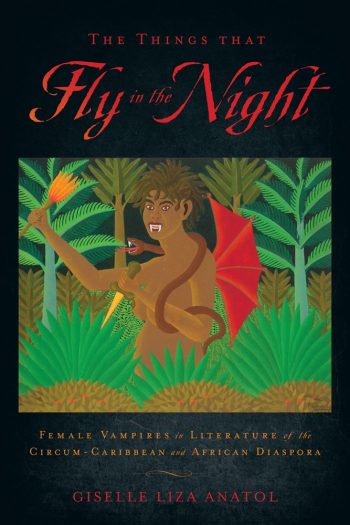 KU Associate Professor of English and author of The Things That Fly in the Night: Female Vampires in Literature of the Circum-Caribbean and African Diaspora (2015), Dr. Giselle Anatol, generated a discussion about the speculative nature of Zora Neale Hurston’s ethnographic research, particularly its immersions into and documentation of the folk practices of people of African descent. NEH Summer Scholars Gary Ford and Sondra Washington led the discussion for Dr. Anatol’s lecture on the Afro-Caribbean figure of the soucouyant in relation to Hurston’s Mules and Men as well as Nalo Hopkinson’s Brown Girl in the Ring and Nisi Shawl’s “The Tawny Bitch.” Two of the primary readings of the week, Hopkinson’s and Shawl’s fiction integrate Afro-Caribbean folklore, magical realism, and feminist speculative fiction. The discussion encouraged participants to think about how writers like Hurston and Hopkinson create empowering illustrations of conjure and hoodoo that uplift Black women and resist negative depictions of black magic that frequently circulate in popular genres like literature and film.
KU Associate Professor of English and author of The Things That Fly in the Night: Female Vampires in Literature of the Circum-Caribbean and African Diaspora (2015), Dr. Giselle Anatol, generated a discussion about the speculative nature of Zora Neale Hurston’s ethnographic research, particularly its immersions into and documentation of the folk practices of people of African descent. NEH Summer Scholars Gary Ford and Sondra Washington led the discussion for Dr. Anatol’s lecture on the Afro-Caribbean figure of the soucouyant in relation to Hurston’s Mules and Men as well as Nalo Hopkinson’s Brown Girl in the Ring and Nisi Shawl’s “The Tawny Bitch.” Two of the primary readings of the week, Hopkinson’s and Shawl’s fiction integrate Afro-Caribbean folklore, magical realism, and feminist speculative fiction. The discussion encouraged participants to think about how writers like Hurston and Hopkinson create empowering illustrations of conjure and hoodoo that uplift Black women and resist negative depictions of black magic that frequently circulate in popular genres like literature and film.
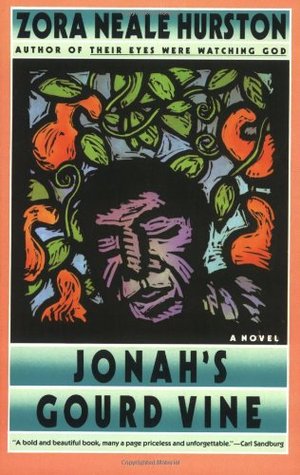 On the last day of the Institute, Summer Scholars presented their works-in-progress which extended discussions of Hurston’s impact, recovery, and endowment. As a tradition in HBW’s NEH Summer Institutes, the concluding forum fostered participants’ integration of materials and future collaboration in publication, teaching, and conferences. The closing presentations introduced Summer Scholars’ fields of research and their unique approach to the future of Hurston’s studies. Some Scholars’ presentations focused on Hurston’s work exclusively, and others were inspired to return to their previous Hurston scholarship to recontextualize their work within contemporary research. For his presentation, Scholar Johnny Jones examined a series of Black plays through the lens of what he called “poetics of the Black vernacular,” and he used Hurston’s “Characteristics of Negro Expression” as a foundational text to understand Black theatre and experiment with creating Black plays. Scholars Michelle Jones, Ayana Weekley, and Jackie Jones discussed potential methods to include Hurston’s lesser-known texts, such as Jonah’s Gourd Vine, Seraph and the Suwanee, and Barracoon, in the classroom. Finally, other participants put Hurston in conversation with figures from other disciplinary backgrounds. For example, Scholar Gary Ford, an Assistant Professor in the Department of Africana Studies at Lehman College and a civil rights lawyer, compared Hurston with famous civil rights activist and state senator Constance Baker Motley, who wrote the brief that later became Brown v. Board of Education. Although Hurston criticized the landmark decision (she did not believe Black people or Black communities were tragic or less than) and Motley was an advocate for integration in public schools, both women were ahead of their times in terms of fighting against racism and sexism. Inspired by the discussion initiated by his presentation, Ford suggested he might write an article on the two women to examine integration and diversity more closely in the future.
On the last day of the Institute, Summer Scholars presented their works-in-progress which extended discussions of Hurston’s impact, recovery, and endowment. As a tradition in HBW’s NEH Summer Institutes, the concluding forum fostered participants’ integration of materials and future collaboration in publication, teaching, and conferences. The closing presentations introduced Summer Scholars’ fields of research and their unique approach to the future of Hurston’s studies. Some Scholars’ presentations focused on Hurston’s work exclusively, and others were inspired to return to their previous Hurston scholarship to recontextualize their work within contemporary research. For his presentation, Scholar Johnny Jones examined a series of Black plays through the lens of what he called “poetics of the Black vernacular,” and he used Hurston’s “Characteristics of Negro Expression” as a foundational text to understand Black theatre and experiment with creating Black plays. Scholars Michelle Jones, Ayana Weekley, and Jackie Jones discussed potential methods to include Hurston’s lesser-known texts, such as Jonah’s Gourd Vine, Seraph and the Suwanee, and Barracoon, in the classroom. Finally, other participants put Hurston in conversation with figures from other disciplinary backgrounds. For example, Scholar Gary Ford, an Assistant Professor in the Department of Africana Studies at Lehman College and a civil rights lawyer, compared Hurston with famous civil rights activist and state senator Constance Baker Motley, who wrote the brief that later became Brown v. Board of Education. Although Hurston criticized the landmark decision (she did not believe Black people or Black communities were tragic or less than) and Motley was an advocate for integration in public schools, both women were ahead of their times in terms of fighting against racism and sexism. Inspired by the discussion initiated by his presentation, Ford suggested he might write an article on the two women to examine integration and diversity more closely in the future.
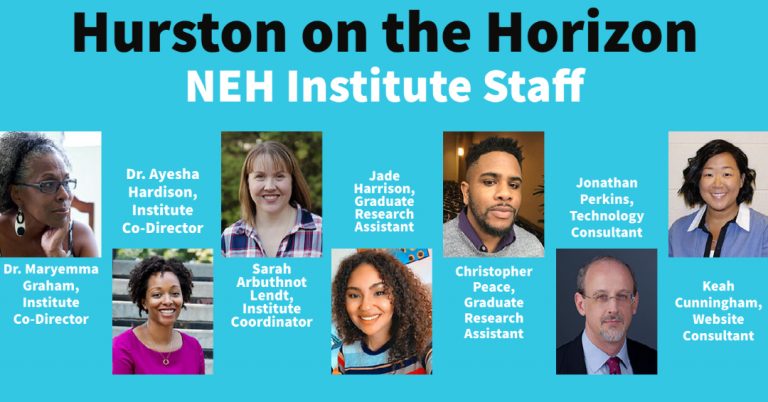 HBW’s Hurston on the Horizon: Past, Present, and Future created a virtual space for reexamining Zora Neale Hurston’s work within her historical moment and within the everchanging contemporary contexts of culture and knowledge production. In returning to Hurston’s work, NEH Summer Scholars created a community of Hurston-philes during the Institute that will hopefully last beyond it. Once a neglected figure within American and African American literature despite her successful writing career during the Harlem or New Negro Renaissance, Hurston is now a permanent fixture in both literary canons. HBW hosted Hurston on the Horizon to convene scholars interested in analyzing emerging trends in Hurston studies, developing new pedagogical approaches to Hurston’s canon, and imagining new directions for Hurston studies. The Institute’s study of Hurston is part of HBW’s larger commitment to recovering Black literature across the diaspora and facilitating innovative, multidisciplinary scholarship about Black writing and culture. Beginning with HBW’s first NEH Summer Institute on teaching African American literature from Phillis Wheatley to Toni Morrison at Northeastern University in 1993, such convenings have been a long running staple in HBW’s history. The 7th HBW NEH Summer Institute at the University of Kansas, Hurston on the Horizon is also the last one directed by HBW’s founding director, Dr. Maryemma Graham, who is retiring from teaching in December 2021. Dr. Graham’s 41-year teaching and research career includes her dedication to students, her recruitment and mentoring of faculty, and her impactful contributions to the fields of African American literary studies and digital humanities. Institute co-director and KU Associate Professor of English and WGSS, Dr. Ayesha Hardison, follows in Dr. Graham’s footsteps, as she became the new director of HBW at the start of the 2021 Institute.
HBW’s Hurston on the Horizon: Past, Present, and Future created a virtual space for reexamining Zora Neale Hurston’s work within her historical moment and within the everchanging contemporary contexts of culture and knowledge production. In returning to Hurston’s work, NEH Summer Scholars created a community of Hurston-philes during the Institute that will hopefully last beyond it. Once a neglected figure within American and African American literature despite her successful writing career during the Harlem or New Negro Renaissance, Hurston is now a permanent fixture in both literary canons. HBW hosted Hurston on the Horizon to convene scholars interested in analyzing emerging trends in Hurston studies, developing new pedagogical approaches to Hurston’s canon, and imagining new directions for Hurston studies. The Institute’s study of Hurston is part of HBW’s larger commitment to recovering Black literature across the diaspora and facilitating innovative, multidisciplinary scholarship about Black writing and culture. Beginning with HBW’s first NEH Summer Institute on teaching African American literature from Phillis Wheatley to Toni Morrison at Northeastern University in 1993, such convenings have been a long running staple in HBW’s history. The 7th HBW NEH Summer Institute at the University of Kansas, Hurston on the Horizon is also the last one directed by HBW’s founding director, Dr. Maryemma Graham, who is retiring from teaching in December 2021. Dr. Graham’s 41-year teaching and research career includes her dedication to students, her recruitment and mentoring of faculty, and her impactful contributions to the fields of African American literary studies and digital humanities. Institute co-director and KU Associate Professor of English and WGSS, Dr. Ayesha Hardison, follows in Dr. Graham’s footsteps, as she became the new director of HBW at the start of the 2021 Institute.
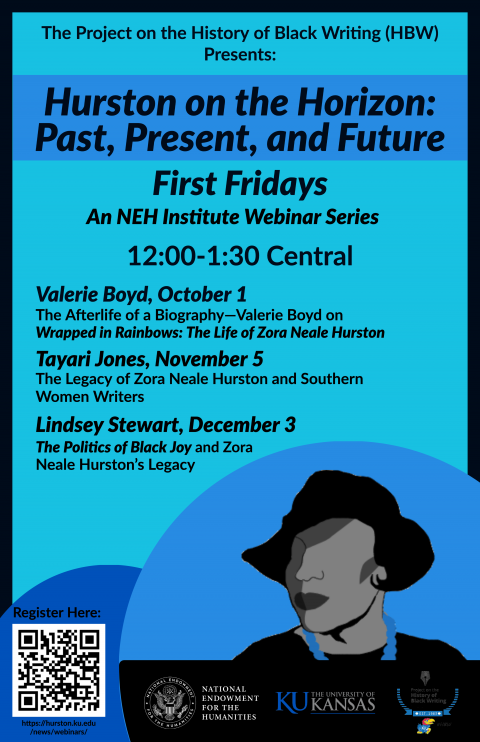 NEH Summer Scholars’ discussion of Hurston’s work has continued throughout the fall and will continue into January 2022. The Institute’s mini conference, which was planned initially to coincide with the 33rd ZORA! Festival of the Arts and Humanities in Eatonville, FL, will now take place online in January. The mini conference will allow Summer Scholars to refine their Hurston-oriented projects and will include Institute faculty and invited guest speakers. Meanwhile, the Institute’s “First Fridays” public webinars have extended Hurston Studies to public audiences and placed Hurston in conversation with contemporary writers and scholars celebrating her legacy. For the third and final installment of HBW’s post-Institute webinar series, Dr. Lindsey Stewart, Assistant Professor of Philosophy at the University of Memphis, will discuss her book The Politics of Black Joy: Zora Neale Hurston and Neo-Abolitionism (2021) on December 3rd. NEH Summer Scholar Leah Milne will moderate this discussion. Please register to join us as we conclude our exploration of Hurston’s life and legacy!
NEH Summer Scholars’ discussion of Hurston’s work has continued throughout the fall and will continue into January 2022. The Institute’s mini conference, which was planned initially to coincide with the 33rd ZORA! Festival of the Arts and Humanities in Eatonville, FL, will now take place online in January. The mini conference will allow Summer Scholars to refine their Hurston-oriented projects and will include Institute faculty and invited guest speakers. Meanwhile, the Institute’s “First Fridays” public webinars have extended Hurston Studies to public audiences and placed Hurston in conversation with contemporary writers and scholars celebrating her legacy. For the third and final installment of HBW’s post-Institute webinar series, Dr. Lindsey Stewart, Assistant Professor of Philosophy at the University of Memphis, will discuss her book The Politics of Black Joy: Zora Neale Hurston and Neo-Abolitionism (2021) on December 3rd. NEH Summer Scholar Leah Milne will moderate this discussion. Please register to join us as we conclude our exploration of Hurston’s life and legacy!
We are celebrating Dr. Maryemma Graham’s 41-year teaching and research career, which has included her commitment to students, her recruitment and mentoring of faculty, her contributions to the fields of literary studies and digital humanities, and her vision for her beloved Project on the History of Black Writing. We invite you to join us in supporting the work of students employed by HBW, by donating to the Amandla Excellence Fund. Named in honor of Marona Amandla Graham-Bailey, Dr. Graham’s late daughter, and a graduate student at the time of her passing, The Amandla Excellence Fund will support all facets of student professional development. Donate to the Amandla Excellence Fund today!